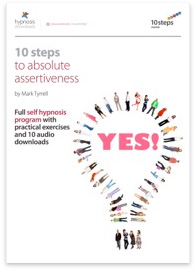5 Golden Keys to Assertiveness and Setting Boundaries
Or why yelling at someone doesn't make you assertive...
 "Let them know where the uncrossable line lies" courtesy of yrandy
"Let them know where the uncrossable line lies" courtesy of yrandy"Humidity is rising, barometer's getting low
According to our sources, the street's the place to go
'Cause tonight for the first time
Just about half past ten
For the first time in history
It's gonna start raining men...IT'S RAINING MEN!"
This was not a weather forecast I wanted bellowed into my addled head at 3am on a Monday morning. I had to be up at 7am; why hadn't I said anything hours ago? I mean, it wasn't even a party; more like a gathering of a few faintly drunken friends in the back garden of a nearby house.
But I knew why I hadn't spoken: For one, I kept foolishly assuming they would suddenly 'realize' how inconsiderate they were being, and that this would happen any second now. Secondly, I was on friendly, 'head-nodding' terms with these neighbours and somehow felt that meant I couldn't be 'rude' to them. I didn't want to feel like some kind of spoilsport uncle (yes, I know, very silly).
It's amazing how sleep and outrage are so far apart on the arousal spectrum. Anger is to sleep what a swift steel-toe-capped kick in the shin is to personal comfort. But throughout this interminable, obnoxious night, I'd worked myself into a frenzy.
The woman finally finished her woeful rendition of 'It's Raining Men' and the two men went back to guffawing loudly at their own wit. Like a smoking volcano ready to blow, I just needed a little more provocation - and it wasn't going to be a small eruption. Then one of the men yelled something to the effect of: "I hope anyone who's listening to this enjoyed Kelly's song!"
That was it. He was actually aware other people could hear their racket and were being kept awake! Run for the hills; the lava's about to flow. Thrusting myself out of a back window, I thundered:
"Stop being so selfish! People need to sleep around here. Maybe you haven't got anything to do in the morning, but I have! Now shut up and take your inane drivel inside!"
Silence. Then: "There's no need to be rude, mate!"
Rude? I hadn't even started. In fact, I was ready to go down there and I think they sensed that:
A) I wasn't joking.
B) I might be a homicidal maniac more interested in physical violence than reasoned debate.
They went inside. The friendly head nods in the street stopped.
The true art of assertiveness
My girlfriend said she was impressed; but I wasn't pleased with the way I'd 'handled' the situation. For years afterwards (and still now, it appears), I would use this incident as an example of how not to be assertive.
Passively not saying anything, hoping the offending person or people would 'come to their senses', and finally exploding in a fiery ball of wrath may have got me what I wanted (eventually), but it's as if I had bypassed diplomatic negotiations, sanctions, and warning shots and gone straight to an all-out nuclear strike. And it had taken me hours to get to that point. Of course, I would do it all differently now. We all live and, hopefully, learn.
So, how should we handle other people when they take liberties?
Step 1) Decide where your boundaries lie
How far is too far? What are you willing and unwilling to take from other people?
Set a limit in your mind and stick to it. This doesn't have to mean you set no leeway, but internally draw a line and don't let them cross it.
I recall a client telling me how she'd met a man at a wedding. She'd given this man her telephone number - not because she'd wanted to, but because he'd asked for it. He called her up and asked to come round. She was busy but said okay. He decided she needed to buy herself a new car. She didn't want one. You've guessed it; by the end of the day, she'd bought one. It didn't work properly, so he took it away to 'sort it out'. She only got it back when her mother made such a fuss that he felt he had to return the unwanted car.
I asked her at what point she would say no to someone. At first, she said she couldn't think of a point, and then she replied, "I can say no on behalf of other people." She had to learn to say enough is enough to protect herself. And when she started to do that, she also began to respect herself more.
We can cut people some slack in life, but please decide just how much you are willing to take.
Step 2) Know that forgiveness can make the situation worse
Many of us like to think we have forgiving natures. And a bit of forgiveness here and there is wonderful and helps the world turn. But - and you knew there was a 'but' coming - if you continually forgive someone their ongoing bad behaviour, they get much worse. Which, of course, doesn't really help them, either.
You see this happening in relationships all the time (including work relationships). If we constantly forgive and make allowances for bad behaviour, it ceases to even be 'bad behaviour' in the eyes of the person doing it.
Research (1) found that people who exhibit aggressive behaviour against their spouses (such as throwing insults; swearing; stamping out of the house; throwing items; or pushing, slapping, kicking, or hitting their spouse) were more likely to continue such behaviour if their partner was forgiving. The fact is, any form of human behaviour can come to seem okay if it seems to be endorsed through forgiveness.
The buck needs to stop somewhere...but how do you clearly let someone know you will not accept bad behaviour?
Step 3) Remember ASSA
Whether you need to talk to a boundary-crossing colleague, a disrespectful partner, or a cantankerous neighbour, you'll need a strategy. Assertiveness is a form of calm, clear communication, not a verbal assault.
So often when we feel upset with someone, we shout or scream; but they genuinely might not clearly get why we are upset. People can be super intelligent in all sorts of ways, but genuinely not understand why they have upset other people. I'm sure you know people like this.
Don't assume people can read your mind and must somehow just know that you are upset. Get used to telling it how you see it.
ASSA stands for:
Alert the person that you want to speak to them. For example: "I want to talk to you about the way you have been yelling at me in front of other staff recently." Notice there is no blaming or emotional language at this point.
State your grievance by telling the person what the problem is. "I'm not happy with you shouting at me." Tell them why it's a problem. "It makes me angry and I think it makes you look unprofessional in front of other staff and customers."
Sell the benefits of them behaving better. "In future, if you have something to say to me, it'd be better for you to talk rather than shout, and do so privately. This will make you appear more professional and improve my morale, as well."
Agree. Seek agreement for doing things differently in future. "Can we agree that from now on, you refrain from shouting and if you ever need to speak to me again, you do it away from other people?" If they agree, then remind them of their agreement if ever they renege on it. All you'll ever have to do in future is remind them of what they agreed.
Notice how clear this communication is. You've neither passively put up with their behaviour nor been so emotional that they can counter-accuse you of being insulting, yelling, or losing your cool, which would actually side-step the issue.
This kind of communication can be a powerful corrective to bad behaviour, creating the kind of environment in which it cannot easily grow and spread. Of course, they might not mend their ways, but at least you have given them a chance to behave better and brought the over-the-line stepping out into the open.
Step 4) Stay calm
This is so important. When people over-step the mark, it's natural to feel disgruntled - even enraged. But assertive, clear communication requires presence of mind and for that to be the case, we need calm. The moment we start launching insults or yelling or sobbing, we have left the realm of credibility.
Sure, it may not be surprising that bad behaviour produces these responses within us, but now we have distracted the person from the issue of their behaviour to how we are now reacting. It's all very well to suggest you stay calm in a situation that requires assertiveness, but actually being calm takes practice; which is why I co-produced a 10 step course to help people naturally train their minds to keep calm during boundary-setting conversations.
It's important to rehearse what you're going to say to someone, but it's just as vital to rehearse or prepare how you're going to feel when you say it. Use self-hypnosis to inwardly 'practice' calmly communicating assertively.
Step 5) Practice honesty
We've all, perhaps, received a hideous gift from a well-meaning relative and pretended to, if not love it, at least quite like it. Sometimes, being slightly less than in-your-face honest is the kind thing to do. But by being more assertive, you not only gain more respect for yourself and others, you can enjoy the greater freedom that comes from being more honest more of the time. Ultimately, it doesn't help other people to live under the illusion that their behaviour is okay when it really isn't.
Because when humidity's rising, barometer's getting low, sometimes clear, concise, and direct language is what is really needed - at least to begin with.
10 Steps to Absolute Assertiveness course
If a lack of assertiveness is keeping you awake at night, help is at hand. You can escape the anger, depression and anxiety it causes with the skills to stand up for yourself, comfortably and calmly...
References
- Associate professor James K. McNulty at the University of Tennessee authored a study, "Does forgiveness combined with negative behavior lead to positive outcomes?" (published in the Journal of Family Psychology), that shows that forgiving your partner for bad behaviour doesn't preserve harmony in marriage - it just reinforces the idea that bad behaviour is forgivable. The study showed that partners who were forgiven for bad behaviour were twice as likely to repeat it the next day.







